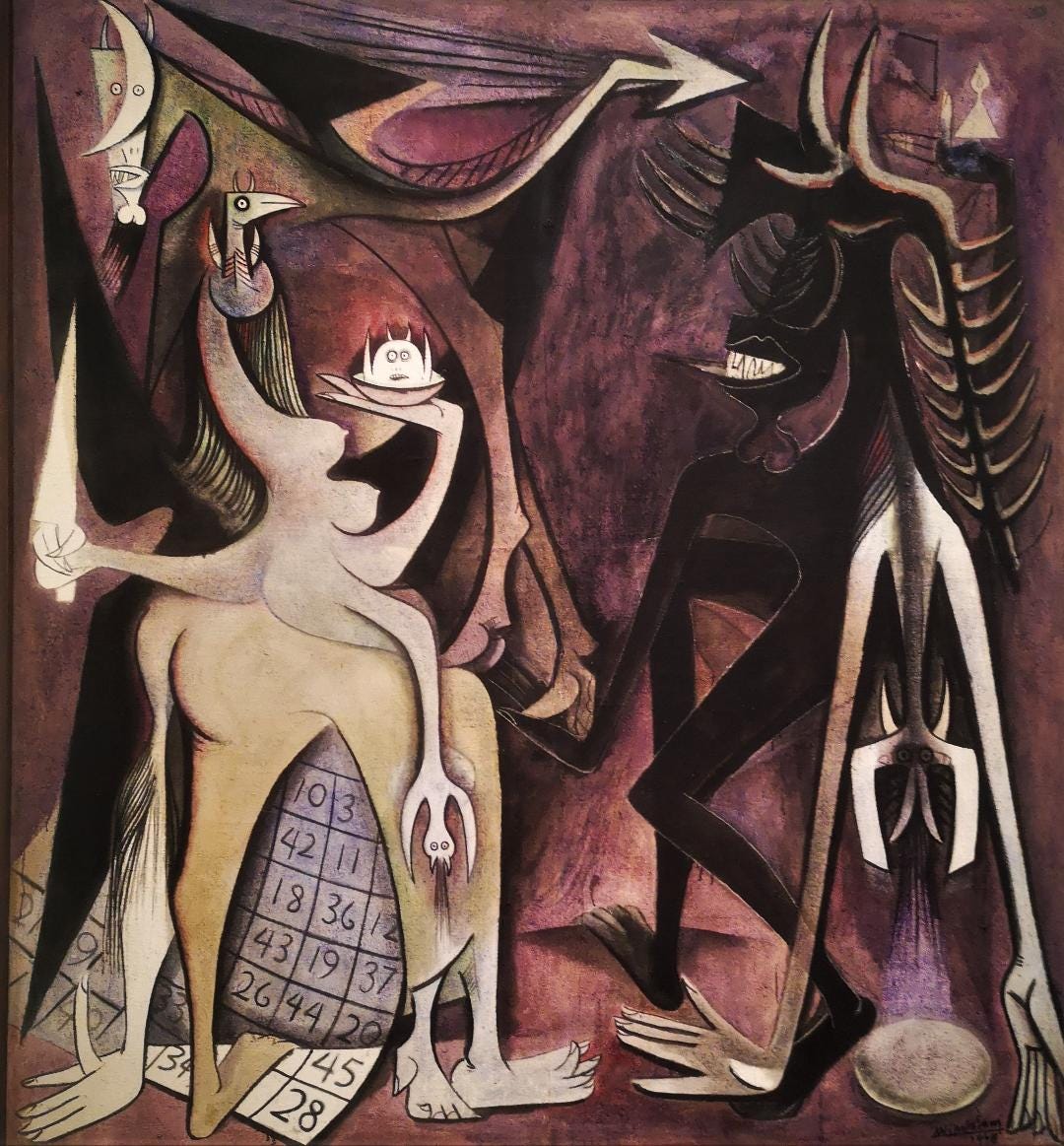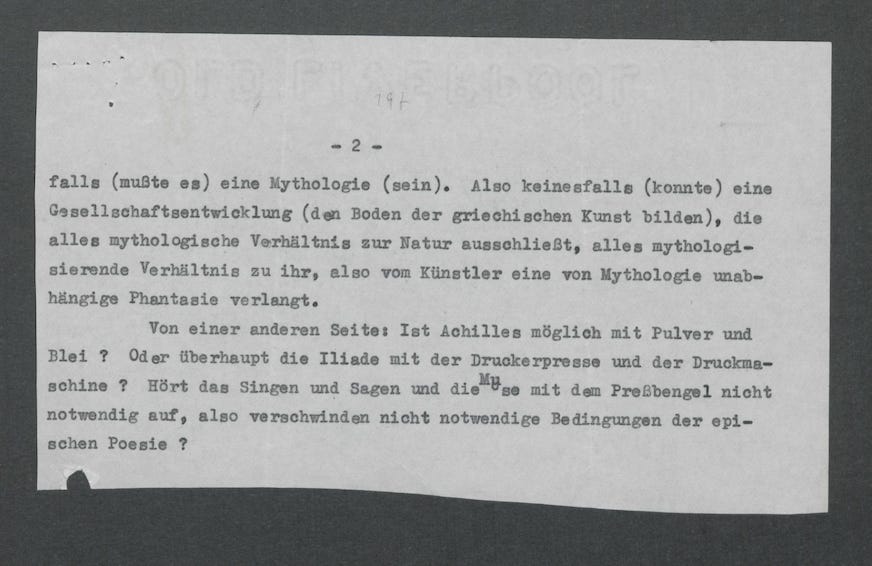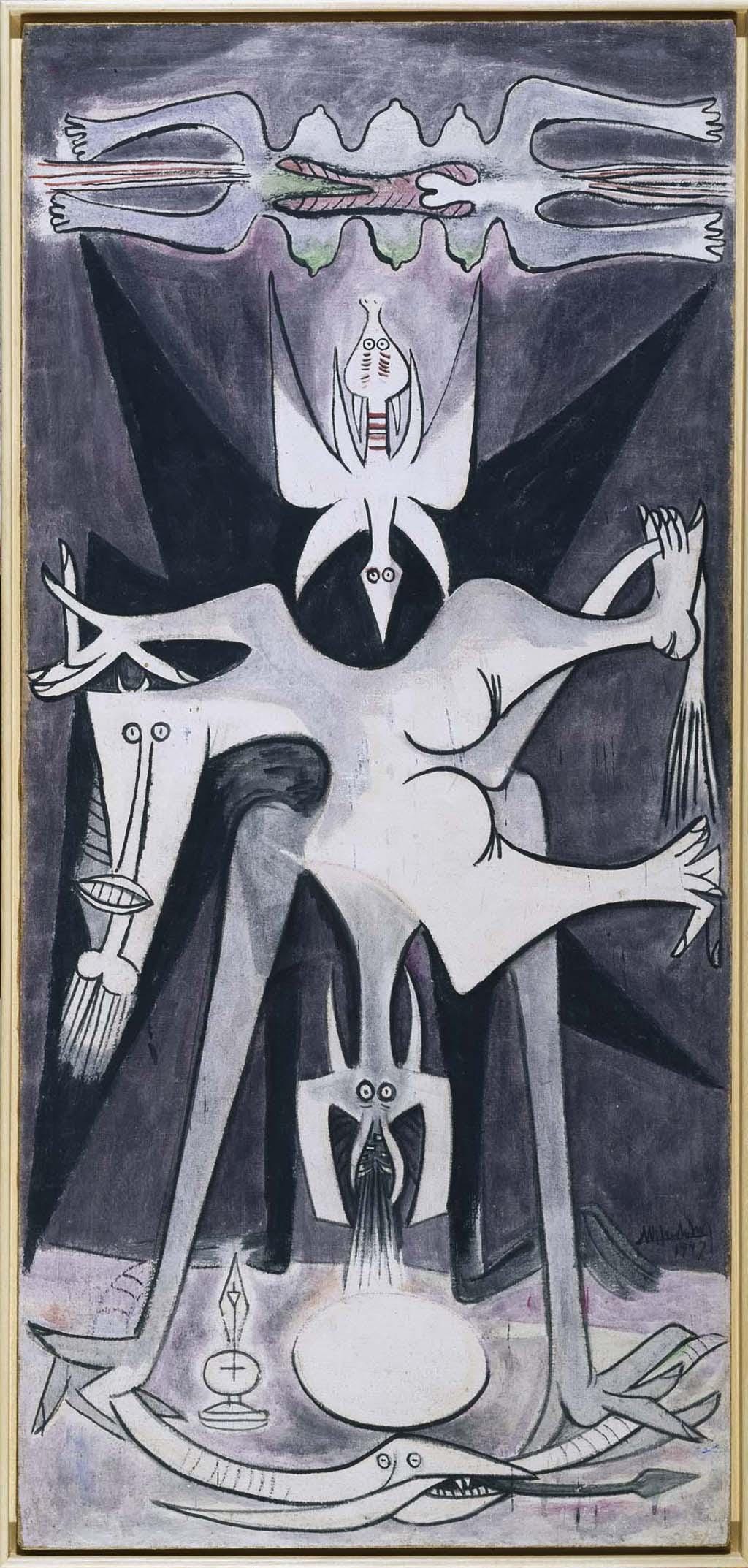Translation: Letters on the Problem of Prehistory (48/49).
Two excerpts on Marx from Adorno and Horkheimer's correspondence.
Horkheimer: On the Metabiological Context of Social Theory.
[Excerpt from: Horkheimer to Löwenthal, 11/23/1948.]1
I have begun developing an idea which, I believe, has great theoretical consequences. Both Marx and Nietzsche, in connection with Darwin’s hypotheses, saw the development of society in a kind of metabiological context. They tried to reach back, though in a modern way, behind the strict dualism of man and nature. Concepts such as [Marx’s] ‘social metabolism with nature’ or [Nietzsche’s] ‘man as bridge to the superman’—indeed, the concept of the ‘natural law of society’ in its deeper sense—are actually incompatible with such dualism.2 It now strikes me as particularly fruitful that Marx sees the structure of society, the class order and its historical shifting, as consequence or even continuation of the harshness of nature. The contradictions internal to society are a product of the human being’s adaptation to desolate, unyielding conditions. In the process of this transformation, social forces undergo transformation, until the point when, in the end, the internal constitution of the human being is no longer dictated by such “metabolism.”
Aside from the striking similarity between the line of thought in both thinkers, the arc of which ends in the identity a higher species with the realization of freedom (to this I cannot agree at all), it sheds light on a central theme of modern psychology. Modern psychology sees the symptom, whether it consists of inhibition or “misdirected” aggression, as the result of a frustration (frustration-aggression). What could this be except for a repetition of the harshness of nature and class conflict that has dominated the prehistory of humanity! The internal conflict, of the individual as well as society, results from the external opposition of unsatisfied will and harsh reality, which are ultimately one and the same. Psychology, ever the good Puritan, sees a solution in the inner-worldly adjusting of the individual; the aforementioned philosophers seek reconciliation in the realization of a higher humanity. I have been meditating on the possibility of a “path” that I dare not even hint at in a letter. All I can say for now is that it largely coincides with the concept of restored enlightenment. If freedom has something to do with a higher species, then this can only be in the sense that it already exists in the theoretical and practical struggle of the individual to create it; not as if the species, as Marx thought, would completely subjugate nature, but in such a way that it would learn to appease the contradiction.
Adorno: On Marx’s Concept of Prehistory (1949).
[Excerpt from: Adorno to Horkheimer, 7/2/1949.]3
The enclosed passage4 is from the fragmentary introduction [viz., to the Grundrisse] (not the famous preface) to Marx’s Zur Kritik [1859]. I had quite a bit of fun with that last lecture for the analysts because of all the nonsense it involved. It made me realize for the first time that the history of the “universal,”5 which is then modified and concretized through the particular (as Grossmann is always harping on about), actually has a different meaning entirely. In truth, the universal is perennial repression, which, in essence, does not change in the whole of “prehistory” (Marx was still using this expression in 1859);6 the particularization [Besonderung] of the universal refers to the dialectic of the forces and relations of production within this negative invariance. In other words, particularization is not, as the scientistic Grossmann thinks, a subsumptive-logical relation, but concerns the structure of history itself. This suits us quite well for a number of reasons (e.g., the motive of the historical-philosophical fragment in our Dialectic [viz., “On the Critique of the Philosophy of History”]).
Excerpt from: Horkheimer to Leo Löwenthal, 11/23/1948. In: MHGS, Bd. 17 (1996), 1039-1041. Author’s translation.
[MHGS Ed. Note:] (...) In response to the question in Löwenthal’s reply, Horkheimer wrote again in a letter of 11/20/1948: “I had formulated the sentence in much too complicated a way. It says that Marx’s concept of the metabolism of nature and Nietzsche’s of the superman, and furthermore the concept of a social natural law, are actually incompatible with the assumption of a strict dualism of man and nature.” In: MHGS, Bd. 17 (1996), 1043. Author’s translation.
In: Theodor W. Adorno, Max Horkheimer. Briefwechsel 1927-1969. Band III: 1945-1949. Edited by Christoph Gödde and Henri Lonitz (Suhrkamp, 2005), 282-283.
Screenshots from MHA [link]
From Marx’s Grundrisse:
In the case of the arts, it is well known that certain periods of their flowering are out of all proportion to the general development of society, hence also to the material foundation, the skeletal structure as it were, of its organization. For example, the Greeks compared to the moderns or also Shakespeare. It is even recognized that certain forms of art, e.g. the epic, can no longer be produced in their world epoch-making, classical stature as soon as the production of art, as such, begins; that is, that certain significant forms within the realm of the arts are possible only at an undeveloped stage of artistic development. If this is the case with the relation between different kinds of art within the realm of the arts, it is already less puzzling that it is the case in the relation of the entire realm to the general development of society. The difficulty consists only in the general formulation of these contradictions. As soon as they have been specified, they are already clarified.
Let us take e.g. the relation of Greek art and then of Shakespeare to the present time. It is well known that Greek mythology is not only the arsenal of Greek art but also its foundation. Is the view of nature and of social relations on which the Greek imagination and hence Greek [mythology] is based possible with self-acting mule spindles and railways and locomotives and electrical telegraphs? What chance has Vulcan against Roberts and Co., Jupiter against the lightning-rod and Hermes against the Crédit Mobilier? All mythology overcomes and dominates and shapes the forces of nature in the imagination and by the imagination; it therefore vanishes with the advent of real mastery over them. What becomes of Fama alongside Printing House Square? Greek art presupposes Greek mythology, i.e. nature and the social forms already reworked in an unconsciously artistic way by the popular imagination. This is its material. Not any mythology whatever, i.e. not an arbitrarily chosen unconsciously artistic reworking of nature (here meaning everything objective, hence including society). Egyptian mythology could never have been the foundation or the womb of Greek art. But, in any case, a mythology. Hence, in no way a social development which excludes all mythological, all mythologizing relations to nature; which therefore demands of the artist an imagination not dependent on mythology.
From another side: is Achilles possible with powder and lead? Or the Iliad with the printing press, not to mention the printing machine? Do not the song and the saga and the muse necessarily come to an end with the printer’s bar, hence do not the necessary conditions of epic poetry vanish?
But the difficulty lies not in understanding that the Greek arts and epic are bound up with certain forms of social development. The difficulty is that they still afford us artistic pleasure and that in a certain respect they count as a norm and as an unattainable model.
A man cannot become a child again, or he becomes childish. But does he not find joy in the child’s naïvité, and must he himself not strive to reproduce its truth at a higher stage? Does not the true character of each epoch come alive in the nature of its children? Why should not the historic childhood of humanity, its most beautiful unfolding, as a stage never to return, exercise an eternal charm? There are unruly children and precocious children. Many of the old peoples belong in this category. The Greeks were normal children. The charm of their art for us is not in contradiction to the undeveloped stage of society on which it grew. [It] is its result, rather, and is inextricably bound up, rather, with the fact that the unripe social conditions under which it arose, and could alone arise, can never return.
“universal”: [“Allgemeinen”]
Marx, “Preface” to A Contribution to the Critique of Political Economy (1959):
Mankind thus inevitably sets itself only such tasks as it is able to solve, since closer examination will always show that the problem itself arises only when the material conditions for its solution are already present or at least in the course of formation. […] The bourgeois mode of production is the last antagonistic form of the social process of production – antagonistic not in the sense of individual antagonism but of an antagonism that emanates from the individuals' social conditions of existence – but the productive forces developing within bourgeois society create also the material conditions for a solution of this antagonism. The prehistory of human society accordingly closes with this social formation.





